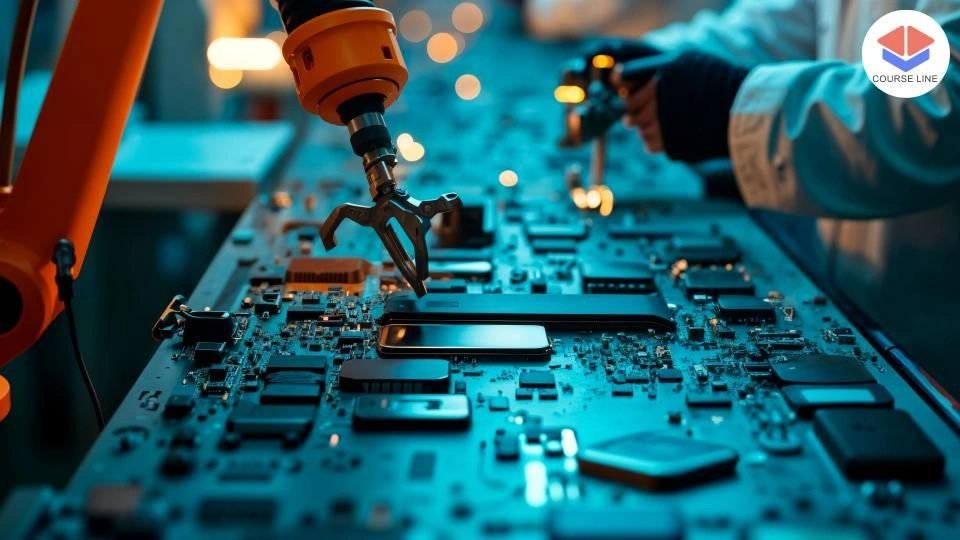Course Features
Price
Study Method
Online | Self-paced
Course Format
Reading Material - PDF, article
Duration
6 hours, 5 minutes
Qualification
No formal qualification
Certificate
At completion
Additional info
Coming soon
- Share
Overview
Who is this course for?
Requirements
Career path
-
- What is Mechatronics? 00:10:00
- History and Evolution of Mechatronics 00:10:00
- Applications of Mechatronics in Engineering 00:10:00
-
- Mechanical Principles in Mechatronics 00:10:00
- CAD (Computer-Aided Design) for Mechatronics 00:10:00
- Materials and Manufacturing Processes in Mechatronics 00:10:00
- Fundamentals of Electronics 00:10:00
- Sensors and Actuators in Mechatronics 00:10:00
- Analog and Digital Circuits 00:10:00
- Introduction to Programming Languages 00:10:00
- Programming Microcontrollers 00:10:00
- Interfacing Software and Hardware 00:10:00
- Data Acquisition Techniques 00:10:00
- Data Analysis and Visualization 00:10:00
- IoT (Internet of Things) and Mechatronics 00:10:00
- Project Planning and Proposal 00:10:00
- Design and Implementation 00:10:00
- Project Presentation and Evaluation 00:10:00
- Exam of Mechatronics Engineering Level 3 Advanced Diploma 00:50:00

No Reviews found for this course.
Is this certificate recognized?
Yes, our premium certificate and transcript are widely recognized and accepted by embassies worldwide, particularly by the UK embassy. This adds credibility to your qualification and enhances its value for professional and academic purposes.
I am a beginner. Is this course suitable for me?
Yes, this course is designed for learners of all levels, including beginners. The content is structured to provide step-by-step guidance, ensuring that even those with no prior experience can follow along and gain valuable knowledge.
I am a professional. Is this course suitable for me?
Yes, professionals will also benefit from this course. It covers advanced concepts, practical applications, and industry insights that can help enhance existing skills and knowledge. Whether you are looking to refine your expertise or expand your qualifications, this course provides valuable learning.
Does this course have an expiry date?
No, you have lifetime access to the course. Once enrolled, you can revisit the materials at any time as long as the course remains available. Additionally, we regularly update our content to ensure it stays relevant and up to date.
How do I claim my free certificate?
I trust you’re in good health. Your free certificate can be located in the Achievement section. The option to purchase a CPD certificate is available but entirely optional, and you may choose to skip it. Please be aware that it’s crucial to click the “Complete” button to ensure the certificate is generated, as this process is entirely automated.
Does this course have assessments and assignments?
Yes, the course includes both assessments and assignments. Your final marks will be determined by a combination of 20% from assignments and 80% from assessments. These evaluations are designed to test your understanding and ensure you have grasped the key concepts effectively.
Is this course accredited?
We are a recognized course provider with CPD, UKRLP, and AOHT membership. The logos of these accreditation bodies will be featured on your premium certificate and transcript, ensuring credibility and professional recognition.
Will I receive a certificate upon completion?
Yes, you will receive a free digital certificate automatically once you complete the course. If you would like a premium CPD-accredited certificate, either in digital or physical format, you can upgrade for a small fee.
Course Features
Price
Study Method
Online | Self-paced
Course Format
Reading Material - PDF, article
Duration
6 hours, 5 minutes
Qualification
No formal qualification
Certificate
At completion
Additional info
Coming soon
- Share
CIMA: Financial Reporting & Compliance – Intermediate Concepts
Course Line237£490.00Original price was: £490.00.£14.99Current price is: £14.99.Level 3 Diploma in Sports Management & Football Operations
Course Line237£490.00Original price was: £490.00.£14.99Current price is: £14.99.Director of Football Level 2: Talent Identification and Scouting Essentials
Course Line239£490.00Original price was: £490.00.£14.99Current price is: £14.99.





